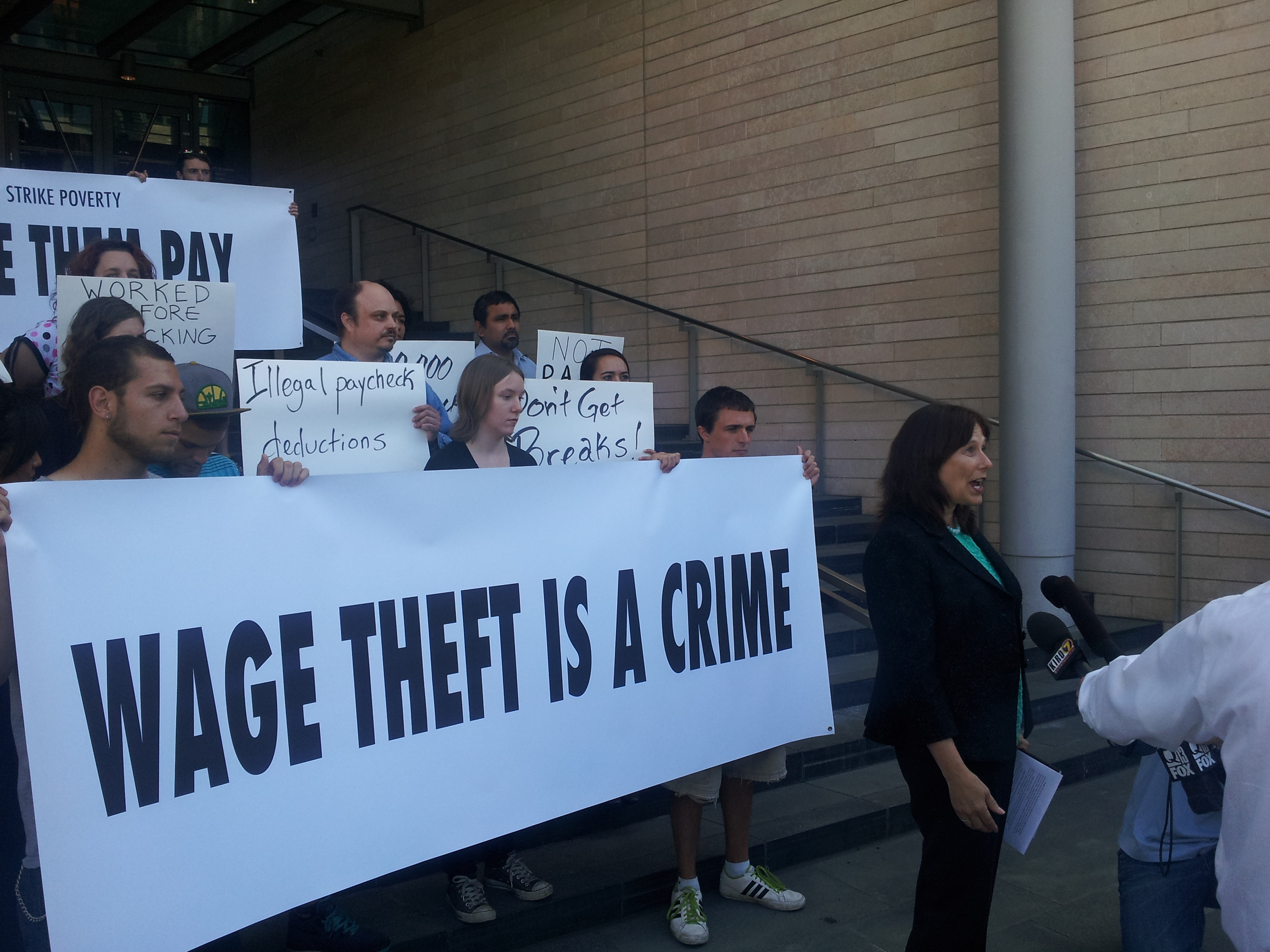Fast food workers announced today that they are filing criminal complaints with the Seattle Police Department on the grounds that their employers committed wage theft, with fast food workers in Seattle allegedly losing as much as $100,000 a week.
Wage theft occurs when employers force workers to forego breaks, deny overtime pay, or clock out before their work is finished. Good Jobs Seattle said it’s received hundreds of complaints in their outreach “detailing multiple frequent violations of wage theft law in the fast food industry.”
The announcement was hosted by Rebecca Smith of the National Employment Law Project on the steps of Seattle City Hall this morning, calling wage theft a defining trend of the 21st century. It was attended by Mayor Mike McGinn, city councilmember Mike O’Brien, chief criminal prosecutor Craig Sims, and supporters holding up signs that read “Make them pay.”
“Literally dozens of studies [have found wage theft] at an epidemic level in low wage industries,” says Smith. “Even more alarming is that these violations occur in the very industries that are fueling growth in our economy.”
Although the City Council unanimously passed an ordinance that strengthens protections for workers against wage theft in 2011, no prosecutions have been filed. Sims spoke at the press conference saying that all the cases brought to his office so far have been “factually insufficient,” though he couldn’t go into detail given that the unscrupulous employers in question might try to save themselves.
“We’ve heard a number of allegations around this. I believe that this is happening, and is probably systemic,” says councilmember Mike O’Brien, who was instrumental in passing the wage theft ordinance. “[We need] to make sure that we have all the right tools in this city, so that when someone is brave enough and has the courage to come forward and say ‘I’m not being treated fairly,’ that we can remedy that process.”
Three fast food workers from the Ballard Taco Bell, Broadway Qdoba, and Northgate Subway came forward at the press conference, citing unfair employment practices that drove them to file complaints with the city.
Caroline Durocher says her closing shifts at Taco Bell could sometimes stretch to five in the morning, while her manager had already clocked her out hours before, estimating $800 stolen from her in the six months she worked there.
“That was money that could’ve meant a whole lot to me. That was money that could’ve meant a deposit on an apartment, because I don’t have a stable place to live. That was money that could’ve been the root canal I’ve needed for a year. That money could’ve been food, bills, and my phone bill that I often can’t pay,” says Durocher.
“These issues are serious, and they’re actually happening. This isn’t just my Taco Bell, this is happening in fast food all across the city and all across the country.”
The announcement comes on the heels of a new study released by the National Employment Law Project that documents the limited opportunities for advancement in the fast food industry. Their analysis finds that only 2.2 percent of jobs in the industry are managerial, technical, or professional positions.
“The truth is, millions of fast-food workers will never have an opportunity to move beyond front line jobs. That’s why it’s so critical that instead of empty promises of future possibilities, the industry act to ensure that the jobs most fast food workers occupy provide the wages and benefits workers need to support themselves and their families,” said executive director Christine Owens.
Fast food workers have been pretty vocal in the past couple months, staging walk-outs, protests, and testimonies to City Council members. With any luck, the total of five workers who filed complaints will be able to make their cases “factually sufficient” for the investigating parties.
“To live on minimum wage is enough of a struggle,” says Geoff Belforti, a former Qdoba employee whose paycheck was withheld for unknown reasons. “But to withhold wages from a dedicated worker is nothing short of a criminal offense.”








